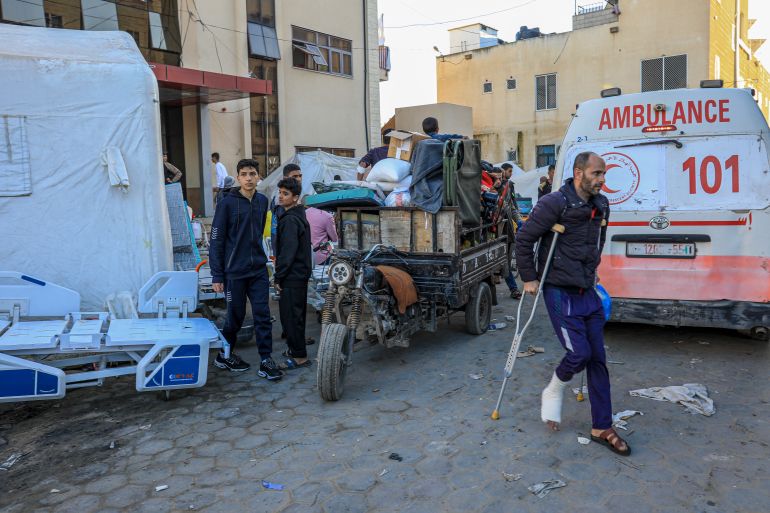Blackout in Gaza’s Al-Aqsa Hospital as fuel runs out, babies at high risk
Israeli military attacks in the vicinity have left patients and medical staff to an uncertain fate.

A total blackout at the Al-Aqsa Martyrs Hospital in central Gaza, one of the last functioning medical facilities in the enclave, has put the lives of its most vulnerable patients at risk with no fuel left to power generators and as the Israeli military was attacking areas nearby.
“We’re trying to work with what we have. But we will have to stop working completely, because we don’t have any electricity,” one doctor at the hospital told Al Jazeera. “There’s a complete outage so how can we treat the patients?”
Keep reading
list of 3 itemsPhotos: Terrified people flee Israeli attacks at Al-Aqsa Martyrs Hospital
‘Giving up is not an option’: Volunteer doctors at Al-Aqsa Martyrs Hospital
Particularly at risk were premature and newborn babies, as well as patients in intensive care units. Gaza’s Government Media Office in a statement said they were at extreme risk of death.
Earlier footage showed medical staff in dark rooms trying to work with flashlights.
“We worked on the light of mobile phones to take care of the condition of children in intensive care, and the devices work on secondary power, and if they stop, the children lose their lives,” said Dr Warda al-Awawdeh, who works in the nursery unit.
One doctor said “all we can do is give some primary care. It’s very tough on us as medical staff”.
Many of the babies in the facility “suffer from malnutrition, they’re underweight. They can get sick easily, even die, god forbid,” said another doctor. “We have three babies in the incubators and 10 others in the other room.”
Thousands of displaced people had been sheltering at the Deir el-Balah facility as Israel’s bombardment of the coastal enclave continues, with at least 151 people killed on Friday.
Gaza’s Ministry of Health said on Saturday that at least 23,843 people have been killed and 60,317 wounded in Israeli attacks on Gaza since October 7.
‘Huge implications’
James Smith, an emergency physician with Medical Aid for Palestinians who recently worked at Al-Aqsa, said the electricity outage will significantly hinder the facility’s capacity to provide medical care to patients and admit those seeking assistance.
“A hospital can’t function without electricity. This is a basic requirement for the functioning of any health facility,” Smith told Al Jazeera.
“So this has huge implications in terms of the ability to deliver ongoing clinical care to patients, to current inpatients, but also to the hospital’s capacity to accept new patients or safely transfer them to other healthcare facilities.”

Meanwhile, the hospital is also increasingly feeling the effect of the expanding Israeli military ground operations in central Gaza.
“The vicinity of the hospital had been widely attacked by the Israeli military as a number of residential buildings there had been destroyed, alongside the fact that the hospital exists in an area that is considered to be a battle zone,” Al Jazeera’s Tareq Abu Azzoum reported from Gaza.
“With the expansion of Israeli military operations … the hospital may be exposed to new threats,” he said on Saturday.
UN aid chief Martin Griffiths on Friday said the health system in Gaza was “in a state of collapse”, adding that women were unable to give birth safely and children unable to get vaccinated. “The sick and injured cannot get treatment. Infectious diseases are on the rise,” he said in his remarks to the UN Security Council.
“There is no safe place in Gaza. Dignified human life is a near impossibility.”